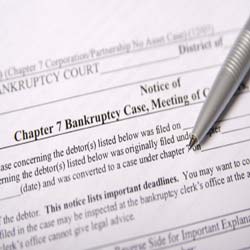 Chapter 7 is often referred to as a “fresh start” bankruptcy because it stops creditors upon filing the case with the bankruptcy court and discharges or eliminates all but certain classes of debt. To be eligible for chapter 7, you must show that your living expenses reasonably consume all or most of your income, and that you have not filed chapter 7 within the past 8 years. Those with incomes above the median level for their household size will typically find it more difficult to prove eligibility for chapter 7.
Chapter 7 is often referred to as a “fresh start” bankruptcy because it stops creditors upon filing the case with the bankruptcy court and discharges or eliminates all but certain classes of debt. To be eligible for chapter 7, you must show that your living expenses reasonably consume all or most of your income, and that you have not filed chapter 7 within the past 8 years. Those with incomes above the median level for their household size will typically find it more difficult to prove eligibility for chapter 7.
Chapter 7 eliminates most debts, with the exception of student loans, some taxes, spousal and child support obligations and court fines. If a creditor can show that a debt was incurred through fraud, that debt will not be discharged in bankruptcy. For this reason, it is important that you do not continue to use credit accounts once you realize you will be unable to repay them.
Chapter 7 can result in the liquidation of some assets. A complicated set of state and federal laws called “exemptions” protect certain categories of assets up to a certain value. The purpose of exemptions is to allow you to keep items necessary for obtaining a fresh start. For example, Oregon law protects to some extent household goods and furnishings, clothing, jewelry, retirement accounts, some home equity and equity in vehicles, tools and firearms. Because exemption laws are complex, it is vital that you consult with a bankruptcy attorney before choosing to file a chapter 7 bankruptcy.

Pingback: Consequences of Filing Bankruptcy - Bankruptcy Attorneys
Pingback: Credit Card Debt and Bankruptcy - Bankruptcy Attorneys
Pingback: What is Chapter 20 Bankruptcy - Bankruptcy Attorneys
Pingback: Lebanon Bankruptcy Attorney - Cascade Bankruptcy